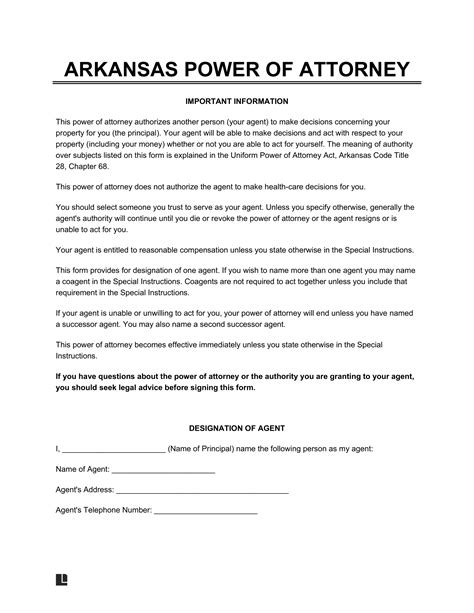Arkansas Power of Attorney Laws: A Comprehensive Guide

Introduction
Greetings, readers! Welcome to our in-depth guide on Arkansas power of attorney laws. This article aims to provide you with a comprehensive understanding of the legal framework surrounding powers of attorney in the state of Arkansas. Whether you’re considering creating a power of attorney or need to understand your rights under one, we’ve got you covered.
As you navigate the legal complexities of Arkansas power of attorney laws, keep in mind that this guide is for informational purposes only. It’s always advisable to consult with an experienced legal professional to ensure your specific needs are met.
Creating a Power of Attorney in Arkansas
Requirements
To create a valid power of attorney in Arkansas, the following requirements must be met:
- The principal (the person granting the power of attorney) must be 18 years of age or older and of sound mind.
- The principal must clearly indicate their intent to create a power of attorney by signing the document in the presence of a notary public.
- The agent (the person receiving the power of attorney) must be specified by name or role (e.g., spouse, child).
Types of Powers of Attorney
Arkansas law recognizes two primary types of powers of attorney:
- Durable Power of Attorney: This type of power of attorney remains effective even if the principal becomes incapacitated. It is commonly used to handle financial and healthcare matters.
- Springing Power of Attorney: This type of power of attorney becomes effective only upon the occurrence of a specific event, such as the principal’s incapacity.
Powers and Limitations of an Agent
General Powers
An agent with power of attorney has the authority to act on behalf of the principal in a wide range of matters, including:
- Managing financial accounts
- Making healthcare decisions
- Selling or purchasing property
- Entering into contracts
Limitations
While an agent has broad powers, there are certain limitations to their authority:
- An agent cannot act contrary to the principal’s wishes or interests.
- An agent cannot create a conflict of interest between themselves and the principal.
- An agent cannot delegate their authority to another person without the principal’s consent.
Revoking or Modifying a Power of Attorney
Revocation
A principal has the right to revoke a power of attorney at any time, regardless of the reason. This can be done by:
- Writing a revocation and delivering it to the agent
- Orally revoking the power of attorney in front of two witnesses
Modification
A power of attorney can be modified by creating a new document that revokes the original power of attorney and creates a new one.
Responsibilities of an Agent
As an agent with power of attorney, you have certain responsibilities:
- You must act in the best interests of the principal.
- You must keep accurate records of all transactions conducted under the power of attorney.
- You must provide the principal with regular accounting of your actions.
Table Breakdown of Arkansas Power of Attorney Laws
| Feature | Requirement |
|---|---|
| Age of Principal | 18 years or older |
| Witnesses | Notary public |
| Types of Powers of Attorney | Durable, Springing |
| Powers of Agent | Financial, healthcare, property management |
| Limitations on Agent’s Authority | Cannot act contrary to principal’s interests, cannot create conflicts of interest, cannot delegate authority |
| Revocation | Written or oral |
| Modification | New document required |
| Agent’s Responsibilities | Act in principal’s best interests, keep accurate records, provide regular accounting |
Conclusion
Arkansas power of attorney laws provide a framework for empowering individuals to designate trusted individuals to act on their behalf. Whether for short-term or long-term needs, understanding these laws is crucial for ensuring the principal’s wishes are carried out and their rights are protected.
For further information, we encourage you to explore our other articles on related topics:
- [Estate Planning in Arkansas](link to article)
- [Healthcare Directives in Arkansas](link to article)
FAQ about Arkansas Power of Attorney Laws
What is a power of attorney?
A power of attorney is a legal document that gives one person (the "agent") the authority to act on behalf of another person (the "principal").
What types of powers of attorney are there?
There are two main types of powers of attorney: general and limited. A general power of attorney gives the agent broad authority to act on behalf of the principal, while a limited power of attorney gives the agent authority to act only in specific matters.
Who can create a power of attorney?
Any person who is 18 years of age or older and of sound mind can create a power of attorney.
How do I create a power of attorney?
To create a power of attorney, you must fill out a form and have it notarized. The form can be found online or at your local office supply store.
What should I include in a power of attorney?
The power of attorney should include the following information:
- The name of the principal
- The name of the agent
- The powers that the agent is granted
- The date the power of attorney was created
- The signature of the principal
- The signature of the notary public
When does a power of attorney become effective?
A power of attorney becomes effective when it is signed by the principal and notarized.
How long does a power of attorney last?
A power of attorney can last for as long as you want it to. However, if the principal becomes incapacitated or dies, the power of attorney will terminate.
Can I revoke a power of attorney?
Yes, you can revoke a power of attorney at any time. To do so, you must give written notice to the agent. The revocation will be effective when the agent receives the notice.
What happens if I don’t create a power of attorney?
If you do not create a power of attorney, your family or friends may have to go to court to get appointed as your guardian or conservator. This can be a time-consuming and expensive process.
Where can I get more information about Arkansas power of attorney laws?
You can get more information about Arkansas power of attorney laws from the Arkansas Secretary of State’s office or from an attorney.




